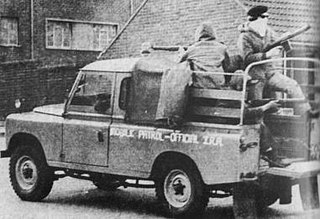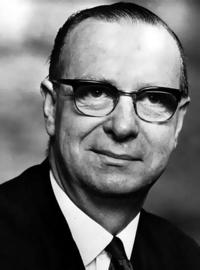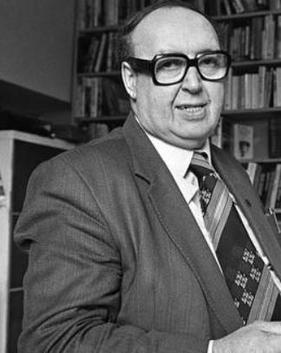
The Official Irish Republican Army or Official IRA was an Irish republican paramilitary group whose goal was to remove Northern Ireland from the United Kingdom and create a "workers' republic" encompassing all of Ireland. It emerged in December 1969, shortly after the beginning of the Troubles, when the Irish Republican Army (IRA) split into two factions. The other was the Provisional IRA. Each continued to call itself simply "the IRA" and rejected the other's legitimacy.

John Hume was an Irish nationalist politician in Northern Ireland and a Nobel Peace Prize laureate. A founder and leader of the Social Democratic and Labour Party, Hume served in the Northern Ireland Parliament; the Northern Ireland Assembly including, in 1974, its first power-sharing executive; the European Parliament and the United Kingdom Parliament. Seeking an accommodation between Irish nationalism and Ulster unionism, and soliciting American support, he was both critical of British government policy in Northern Ireland and opposed to the republican embrace of "armed struggle". In their 1998 citation, the Norwegian Nobel Committee recognised Hume as an architect of the Good Friday Agreement. For himself, Hume wished to be remembered as having been, in his earlier years, a pioneer of the credit union movement.

Josephine Bernadette McAliskey, usually known as Bernadette Devlin or Bernadette McAliskey, is an Irish civil rights leader and former politician. She served as Member of Parliament (MP) for Mid Ulster in Northern Ireland from 1969 to 1974. McAliskey came to national and international prominence at the age of 21 when she became the youngest person ever to become a member of the British Parliament. McAliskey broke the traditional Irish republican policy of abstentionism and took her seat in Westminster. McAliskey's ascension came at the outbreak of the Troubles, an ethno-nationalist conflict which would come to dominate Northern Ireland for the next 30 years. For the majority of that time, McAliskey would be politically active, advocating for a 32-county socialist Irish republic to replace the two states on the island of Ireland. Originally linked to the People's Democracy group, McAliskey was later a founder of the Irish Republican Socialist Party. However, McAliskey left the party after a year when members voted that its paramilitary wing, the Irish National Liberation Army, did not have to obey the political wing.

Gerard Fitt, Baron Fitt was a politician from Northern Ireland. He was a founder and the first leader of the Social Democratic and Labour Party (SDLP), a social democratic and Irish nationalist party.

The Irish Republican Socialist Party or IRSP is a minor communist, Marxist–Leninist and Irish republican party in Ireland. It is often referred to as the "political wing" of the Irish National Liberation Army (INLA) paramilitary group. The party's youth wing is the Republican Socialist Youth Movement (RSYM). It was founded by former members of 'Official' Sinn Féin in 1974 during the Troubles, but claims the legacy of the Irish Socialist Republican Party of 1896–1904. The party opposes the Good Friday Agreement and the European Union.

Patrick Joseph "Paddy" Devlin was an Irish socialist, labour and civil rights activist and writer. He was a founding member of the Social Democratic and Labour Party (SDLP), a former Stormont MP, and a member of the 1974 Power Sharing Executive.
The Northern Ireland Civil Rights Association (NICRA) (Irish: Cumann Cearta Sibhialta Thuaisceart Éireann) was an organisation that campaigned for civil rights in Northern Ireland during the late 1960s and early 1970s. Formed in Belfast on 9 April 1967, the civil rights campaign attempted to achieve reform by publicising, documenting, and lobbying for an end to discrimination against Catholics in areas such as elections (which were subject to gerrymandering and property requirements), discrimination in employment, in public housing and abuses of the Special Powers Act.
The Irish Independence Party (IIP) was a nationalist political party in Northern Ireland, founded in October 1977 by Frank McManus and Fergus McAteer. The party was effectively a merger of Unity and the Nationalist Party, as the bulk of activists and councillors from the two movements joined IIP. However several independent councillors also joined the party. It was boosted in the late 1970s by the defection of a prominent Protestant Larne Social Democratic and Labour Party (SDLP) councillor, John Turnley, later the party chairman, who was killed in 1980 in Carnlough, County Antrim, by an attack claimed by the Ulster Defence Association.

A series of riots in Dublin on 25 February 2006 was precipitated by a proposed march down O'Connell Street of a unionist demonstration. The disturbances began when members of the Garda Síochána attempted to disperse a group of counter-demonstrators blocking the route of the proposed march. The situation escalated as local youths joined forces with the counter-demonstrators.
The following outline is provided as an overview of and topical guide to the Troubles.
Coláiste Feirste is the only secondary-level Irish-medium school in Belfast, Northern Ireland.
Joe McCann was an Irish republican paramilitary. A member of the Irish Republican Army and later the Official Irish Republican Army, he was active in politics from the early 1960s and participated in the early years of the Troubles in Northern Ireland. He was shot dead during a confrontation with RUC Special Branch members and British paratroopers in 1972.
Billy McKee was an Irish republican and a founding member and leader of the Provisional Irish Republican Army.
Events during the year 1969 in Northern Ireland.
The Mid Ulster by-election was held on 17 April 1969 following the death of George Forrest, the Ulster Unionist Party Member of Parliament for Mid Ulster. The two-way contest was unusual in featuring two female candidates.
The Nationalist Party was the continuation of the Irish Parliamentary Party (IPP), and was formed after the partition of Ireland, by the Northern Ireland-based members of the IPP.
Fergus O'Hare is an Irish musician, activist and former republican politician, active in Northern Ireland.
The Northern Resistance Movement was an Irish republican organisation set up by Sinn Féin and People's Democracy following the introduction of internment on 9 August 1971. Bernadette Devlin was involved in founding the group, which from time to time engaged the support of the Northern Ireland Civil Rights Association, with whom they organised the protest march which was attacked by the British state on Bloody Sunday. However their call for an end to Stormont meant that such relationships with more reformist organisations were not always smooth.

Miriam Daly was an Irish republican and communist activist as well as a university lecturer who was assassinated by the loyalist Ulster Defence Association (UDA) in 1980.
The Northern Ireland civil rights movement dates to the early 1960s, when a number of initiatives emerged in Northern Ireland which challenged the inequality and discrimination against ethnic Irish Catholics that was perpetrated by the Ulster Protestant establishment. The Campaign for Social Justice (CSJ) was founded by Conn McCluskey and his wife, Patricia. Conn was a doctor, and Patricia was a social worker who had worked in Glasgow for a period, and who had a background in housing activism. Both were involved in the Homeless Citizens League, an organisation founded after Catholic women occupied disused social housing. The HCL evolved into the CSJ, focusing on lobbying, research and publicising discrimination. The campaign for Derry University was another mid-1960s campaign.








